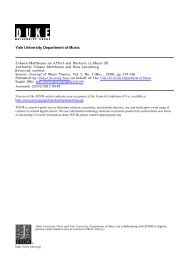Après une Lecture de Liszt: Virtuosity and ... - Free
Après une Lecture de Liszt: Virtuosity and ... - Free
Après une Lecture de Liszt: Virtuosity and ... - Free
You also want an ePaper? Increase the reach of your titles
YUMPU automatically turns print PDFs into web optimized ePapers that Google loves.
19THCENTURYMUSIC73“Desto mehr studierte er als Virtuos, wie <strong>de</strong>nn lebhaftemusikalische Naturen <strong>de</strong>n schnellberedten Ton <strong>de</strong>mtrocknen Arbeiten auf <strong>de</strong>m Papier vorziehen” (rpt.Gesammelte Schriften über Musik und Musiker von RobertSchumann, I, 439.74“Denn hier kann er seimen Gedankenflug (obschon ineiner konsequenten Form) volle Freyheit lassen; und oftkommen, während <strong>de</strong>m Spielen ungesucht, interessanteMotive in die Finger . . . Auch kann in dieser Gattung <strong>de</strong>sFantasierens die momentane Stimmung <strong>de</strong>s Spielen (sie seynun lustig, heiterm ernst o<strong>de</strong>r melancholisch) sich amungezwungensten aussprechen” (Carl Czerny: SystematischeAnleitung, p. 63 [Michell, p. 74]).75Franz <strong>Liszt</strong> letter to Louis Köhler, 9 July 1856, in Lettersof Franz <strong>Liszt</strong>, p. 273.said that <strong>Liszt</strong>’s “lively musical nature prefersexpeditiously eloquent tones to dull scoring onpaper.” 73Although S<strong>and</strong>’s testimony rehearses theRomantic cliché of the unconsciously inspiredcomposer, it also i<strong>de</strong>ntifies <strong>Liszt</strong>’s fractured processof composition <strong>and</strong> lends cre<strong>de</strong>nce to thehypothesis that he tried out the phrases onwhich he was working before notating them.Furthermore, S<strong>and</strong> speaks of the governance of<strong>Liszt</strong>’s “composition” by the spontaneous “instinctof feeling” rather than by the calculated“labour of reason”—an observation that, thoughit too is born of a Romantic commonplace,bears a striking resemblance to Czerny’s advicein his treatise for improvising with severalthemes. An improviser, Czerny states, shoul<strong>de</strong>mploy a variety of <strong>de</strong>velopmental procedures:“[for] here he can give free reign to his flights offancy (albeit in rational form); <strong>and</strong> <strong>une</strong>xpected,interesting motives . . . frequently enter thefingers while playing. . . . The performer’s momentarymood (be it now cheerful, now serene,serious or melancholy) can be expressed in themost ab<strong>and</strong>oned manner.” 74 Czerny’s <strong>de</strong>scriptionalso anticipates the procedure of <strong>Liszt</strong>’sthematically driven sonata in striking fashion.If we accept that thematic transformation generatesformal coherence in works such as <strong>Liszt</strong>’s“quasi Sonata,” <strong>and</strong> that this coherence arisesfrom what <strong>Liszt</strong> <strong>de</strong>scribes as the “necessary<strong>de</strong>velopments of . . . inner experiences . . .feeling <strong>and</strong> invention,” 75 it may be that the“compositional” technique of thematic transformationis, at root, a product of an improvisatorytechnique. 76 There thus seems good reasonto trace it back through Czerny to Beethovenin an exten<strong>de</strong>d pedagogical lineage.Czerny’s influence on <strong>Liszt</strong> as a tutor <strong>and</strong>technical taskmaster is well documented, buthis role in the <strong>de</strong>velopment of <strong>Liszt</strong>’s capacityfor free improvisation has attracted less scholarlyattention. 77 Apparently Phantasieren wasintrinsic to their work together. As Czerny recallsin his autobiography: “I en<strong>de</strong>avored toteach [<strong>Liszt</strong>] Phantasieren by frequently givinghim a theme on which to improvise [improvisieren].”78 Equally, <strong>Liszt</strong> mused in his later yearson this aspect of study with his second—<strong>and</strong>last—piano teacher: “[Czerny] ma<strong>de</strong> me sightreadall the good music of the time <strong>and</strong> alsoma<strong>de</strong> me improvise in fantasy-style [Phantasieren]frequently.” 79 There seems little doubt thatthe improvised transformation of musicalthemes characterized the daily contact the twomusicians shared in Vienna over fourteenmonths between 1822 <strong>and</strong> 1823.With this in mind, let us compare <strong>Liszt</strong>’sthematic transformation in the “Dante” Sonata(ex. 1) with Czerny’s illustrated advice76In this context, it is important to note that <strong>Liszt</strong> transcribedBerlioz’s Symphonie fantastique in 1833. AsJonathan Kregor has suggested, his keyboard study ofBerlioz’s idée fixe <strong>and</strong> its accompanimental figures mayhave provi<strong>de</strong>d an additional stimulus for <strong>Liszt</strong>’s explorationof thematic manipulation in the late 1830s. The successof a symphonic mo<strong>de</strong>l based on thematic unity islikely to have given <strong>Liszt</strong> the confi<strong>de</strong>nce <strong>and</strong> impetus toapply what, for him, had been largely an improvisatorytechnique to the i<strong>de</strong>a of more lofty compositional structures.See Kregor, “Collaboration <strong>and</strong> Content in theSymphonie fantastique Transcription,” Journal of Musicology24 (2007), 203.77The only published study is Zsuzanna Domokus’s examinationof “Fantasy” in <strong>Liszt</strong>’s operatic paraphrases. See“Carl Czernys Einfluss Auf Franz <strong>Liszt</strong>: Die Kunst DesPhantasierens,” in <strong>Liszt</strong> Studien IV, ed. Serge Gut (Munich:Katzbichler, 1993), pp. 19–28. For a general survey of improvisationin the nineteenth century, see also Lutz Felbick,“Vom Einfluss <strong>de</strong>r Improvisation auf das mitteleuropäischeMusikleben <strong>de</strong>s 19. Jahrhun<strong>de</strong>rts,” Musik Theorie 20 (2005),166–82.78“Ebenso bestrebte ich mich, ihm [<strong>Liszt</strong>] das Phantasierenanzueignen, in<strong>de</strong>m ich ihm häufig das Thema zum Improvisierenaufgab” (Carl Czerny, Erinnerungen aus meinemLeben, ed. Walter Kolne<strong>de</strong>r [Strasbourg: Éditions P. H.Heitz, 1968], p. 28).79“Er [Czerny] legte mir alle guten Musikalien <strong>de</strong>rdamaligen Zeit à vista vor und ließ mich auch gerne phantasieren”(August Göllerich, Franz <strong>Liszt</strong>, p. 160).70



